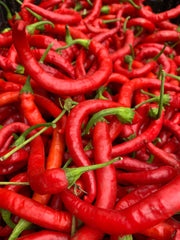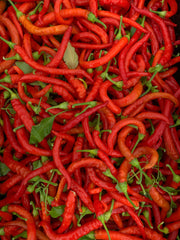Hot Pepper, 'Aci Sivri'
(Capsicum annuum) Aci Sivri is an excellent cayenne-like short season chili originally from Turkey and introduced in the '90s to the US by the old 'Seeds of Change' seed company. An excellent and productive variety for short-growing season areas, its tall frame hangs heavy with long, slender fruits that ripen to a glossy red. Heat levels can vary from plant to plant but are generally middling to hot with flavorful fruity undertones. An excellent choice for powder, flakes, and hot sauces, it has been a mainstay of growers here in the Pacific NW for many years.
Our friend and teacher of all things relating to Turkish peppers, Mehmet Oztan of 'Two Seeds in a Pod' in W. Virginia (if you haven't visited their website we highly recommend), tells us it is probably a made-up generic name, as "aci" means hot and "sivri" means pointy in the context of this type of slender pointed peppers. He suspects it is the same pepper as "Aci Ilica" or a commercial selection of it, "Ilica 256," which are both very common varieties grown by farmers in Turkey.80-90 days. UO
Packet: ~30 seeds
Availability: In stock
Growing Info
SOWING:
Indoors, 6-8 weeks before your last frost date.
Transplant out after danger of frost (50+ nighttime temps).
Note: Protect well from the cold!
PLANTING DEPTH:
1/4"
SPACING:
12-24" spacing in rows 24-36" apart.
EMERGENCE:
7-14 days @ soil temp 70-85F
LIGHT:
Full sun
FERTILITY:
Moderate-Heavy. Prefer well-drained, fertile soil with ample phosphorous and calcium (too little calcium can cause blossom end rot) and a pH between 6.5-6.8.
ADDITIONAL NOTES:
Pepper seeds germinate very slowly and poorly in cold soil. Keep soil temperatures at 80-90F while germinating, and grow plants at 70F.
After transplanting, use a floating row cover to keep plants warmer during the day and protect them from cold nights. Remove as temperatures increase. Too much heat can cause blossom drop.
Taller varieties benefit from staking.
Harvesting ripe fruit consistently encourages fruit production.




